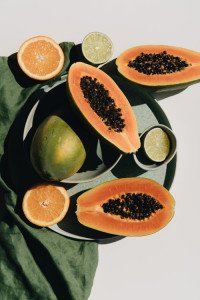At the first sign of cold or flu, we often rush to orange juice for a dose of Vitamin C. But do we really know how Vitamin C works, or what it does?
Let’s take a deep dive and explore the case for Vitamin C as it pertains to Immune health….
The role of the immune system
The immune system is a multifaceted, sophisticated network that consists of specialized organs, tissues, cells, proteins, and chemicals. All of these have evolved over time in order to protect us from a range of pathogens. These can include bacteria, viruses, fungi, and parasites, as well as cancer cells.
When our immune system is not functioning as optimally as it could, it can allow infections and infectious diseases to be contracted more easily. This can result in some serious health concerns.
The role of vitamin C in immune health
Vitamin C is an essential nutrient that cannot be synthesized by humans due to the loss of a key enzyme in the biosynthetic pathway.
Ascorbic acid – the scientific name for pure Vitamin C – plays a very important role in supporting the vast number of immune mechanisms in your body.
For example, your white blood cells are an important component of your immune system. We have several different types of white blood cells, and they each fight off viruses and bacteria in different ways.
What Vitamin C does, is help to stimulate both the production and function of many of the different types of white blood cells. It also helps your cells to produce and release important proteins that bind to invading microbes to neutralise them and to inhibit the reproduction of the viruses.
Vitamin C also has powerful antioxidant properties that also protect certain white blood cells from the self-inflicted oxidative damage that they produce in their fight against pathogens.
In other words, Vitamin C is an essential nutrient for healthy immune system response.

Vitamin C supplementation to boost the immune system
During the cooler months, it’s especially important to be fully-equipped with an arsenal of immune-supportive nutrients in order for your body to have a strong defence against harmful pathogens that have the potential to creep in.
Having a foundation of a nutritious, whole food diet is paramount for a healthy and well functioning immune system. That is always the first step.
The second thing that we may want to consider during the winter months is supplementation with key vitamins and polyphenols as they have the ability to help support the overall immune response.
The recommended daily intake (RDI) for vitamin C is 90 mg for men and 75 mg for women.
Dosing of vitamin C (>1,000 mg/day) in addition to desired amounts of flavonoids can help bolster antioxidant levels that are needed to boost the immune system during the cold and flu season.
However, it is advised to dose vitamin C at no more than 500 mg at a time and to split doses throughout the day to optimise optimal absorption and bioavailability.
Some great dietary sources of vitamin C include kiwifruit, citrus fruits, red bell pepper, strawberries, goji berries, broccoli, brussel sprouts and many more.
Here is a more detailed breakdown of some of the best food sources of vitamin C (per cup)

- Acerola cherry: 2,740% of the RDI
- Guava: 628% of the RDI
- Blackcurrants: 338% of the RDI
- Sweet red pepper: 317% of the RDI
- Kiwifruit: 273% of the RDI
- Lychee: 226% of the RDI
- Lemon: 187% of the RDI
- Orange: 160% of the RDI
- Strawberry: 149% of the RDI
- Papaya: 144% of the RDI
- Broccoli: 135% of the RDI
Please contact your health care provider before taking any form of supplementation. Or why not book a 15 minute mini consultation with our Naturopath Candace Borg for some quick supplement advice.
Resources : Designs for health

